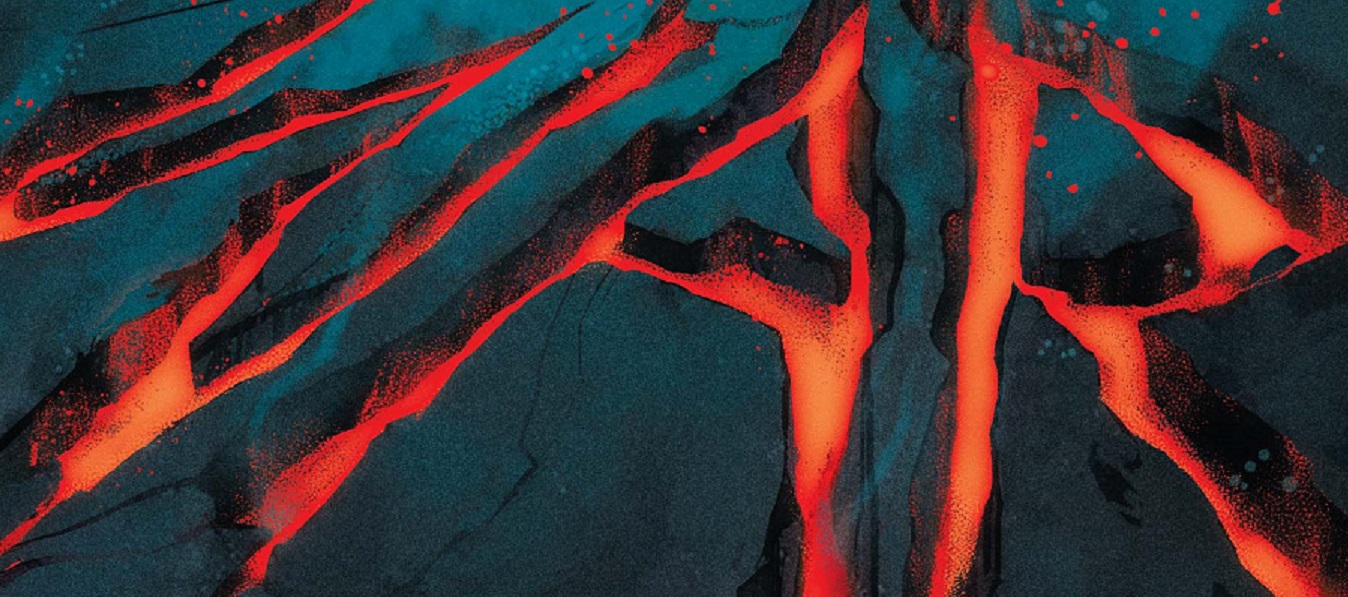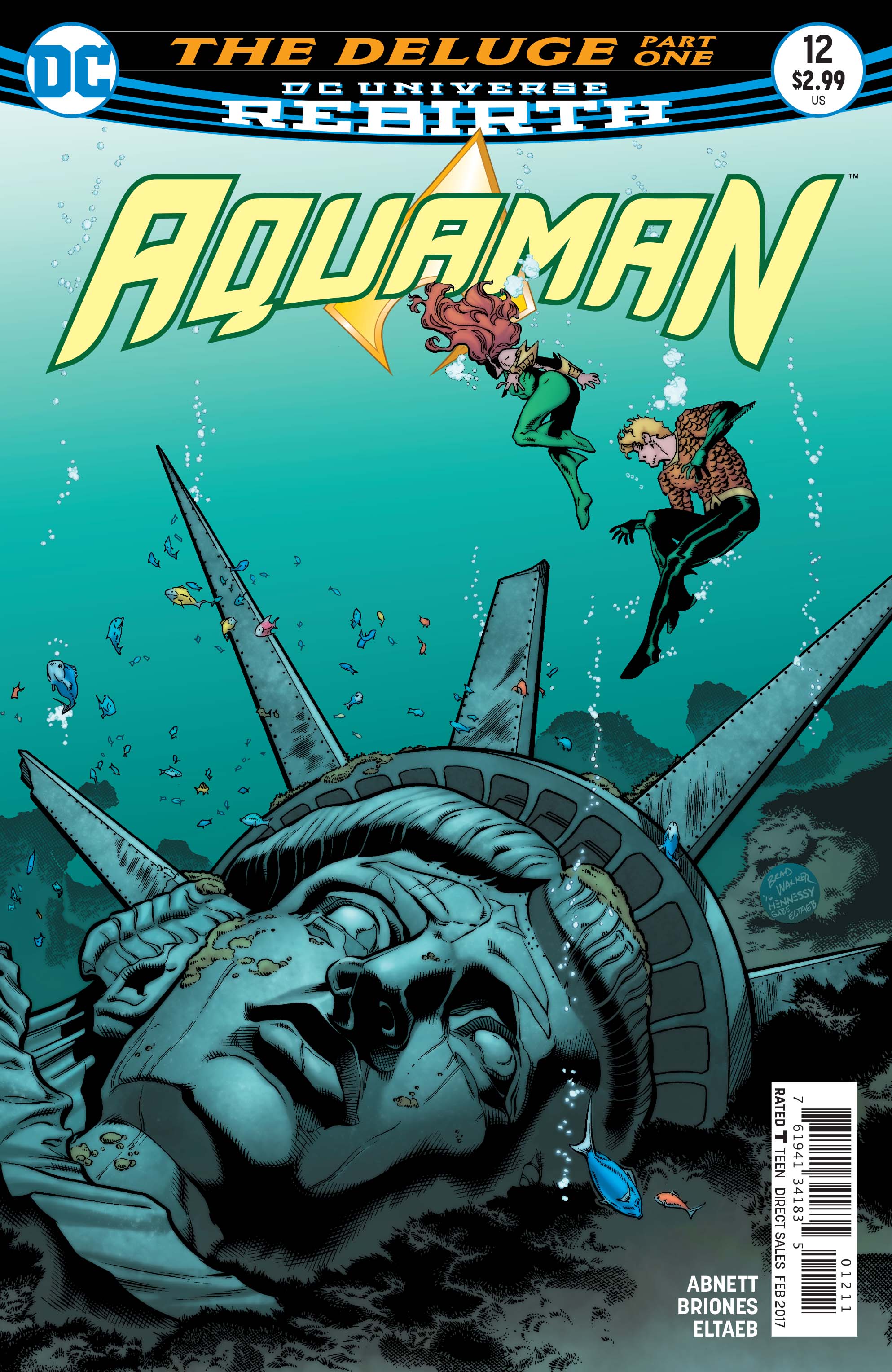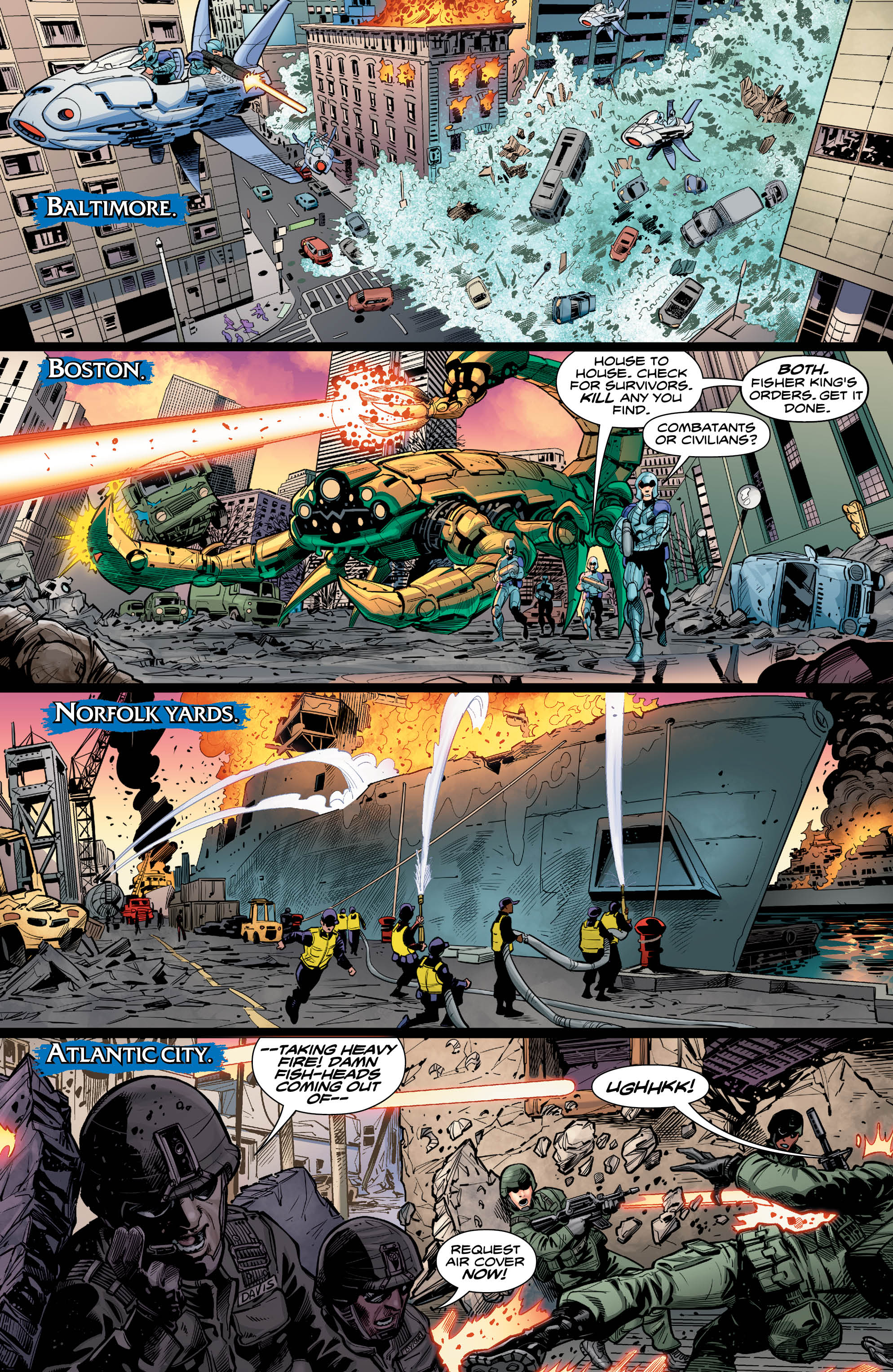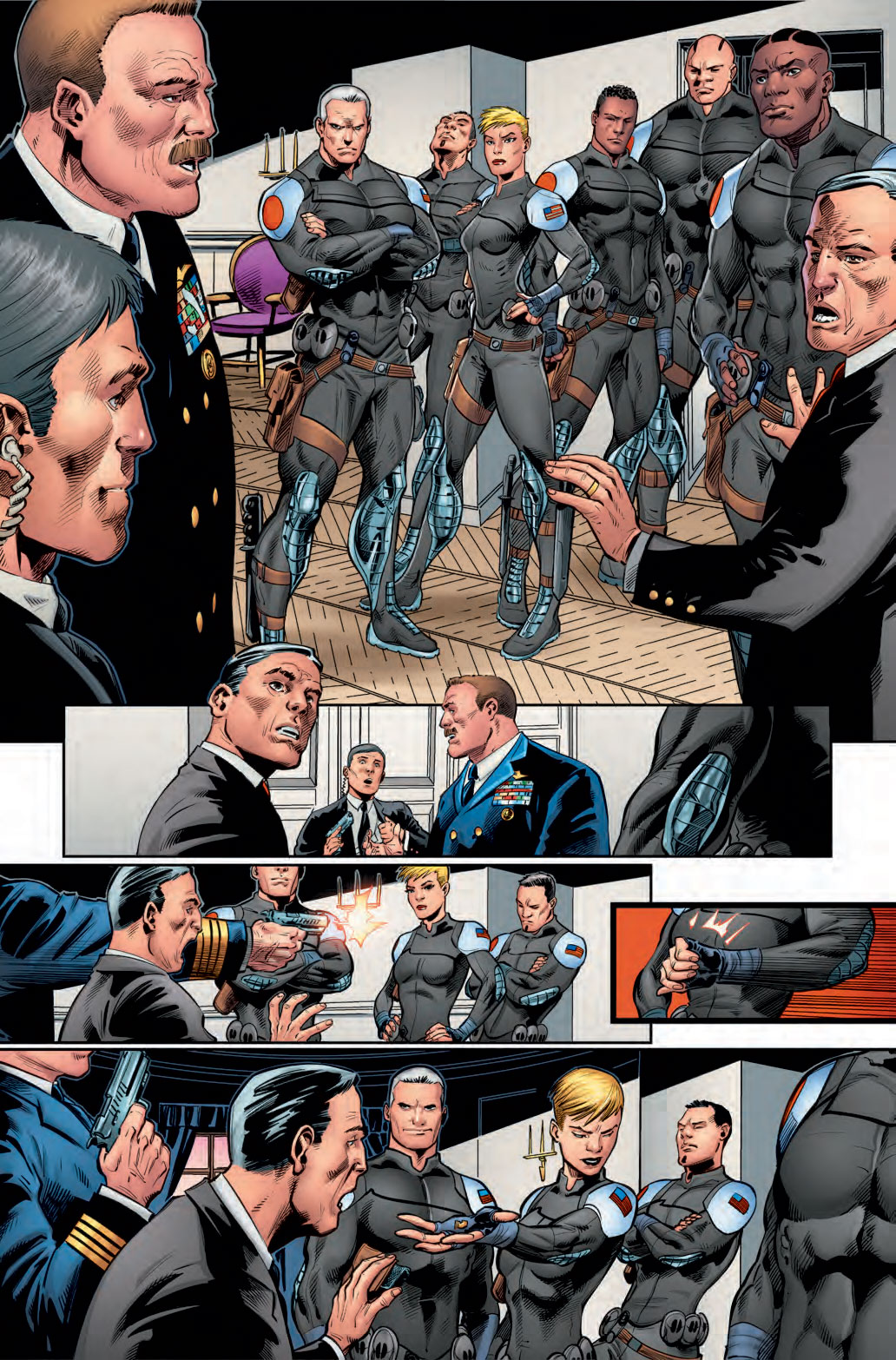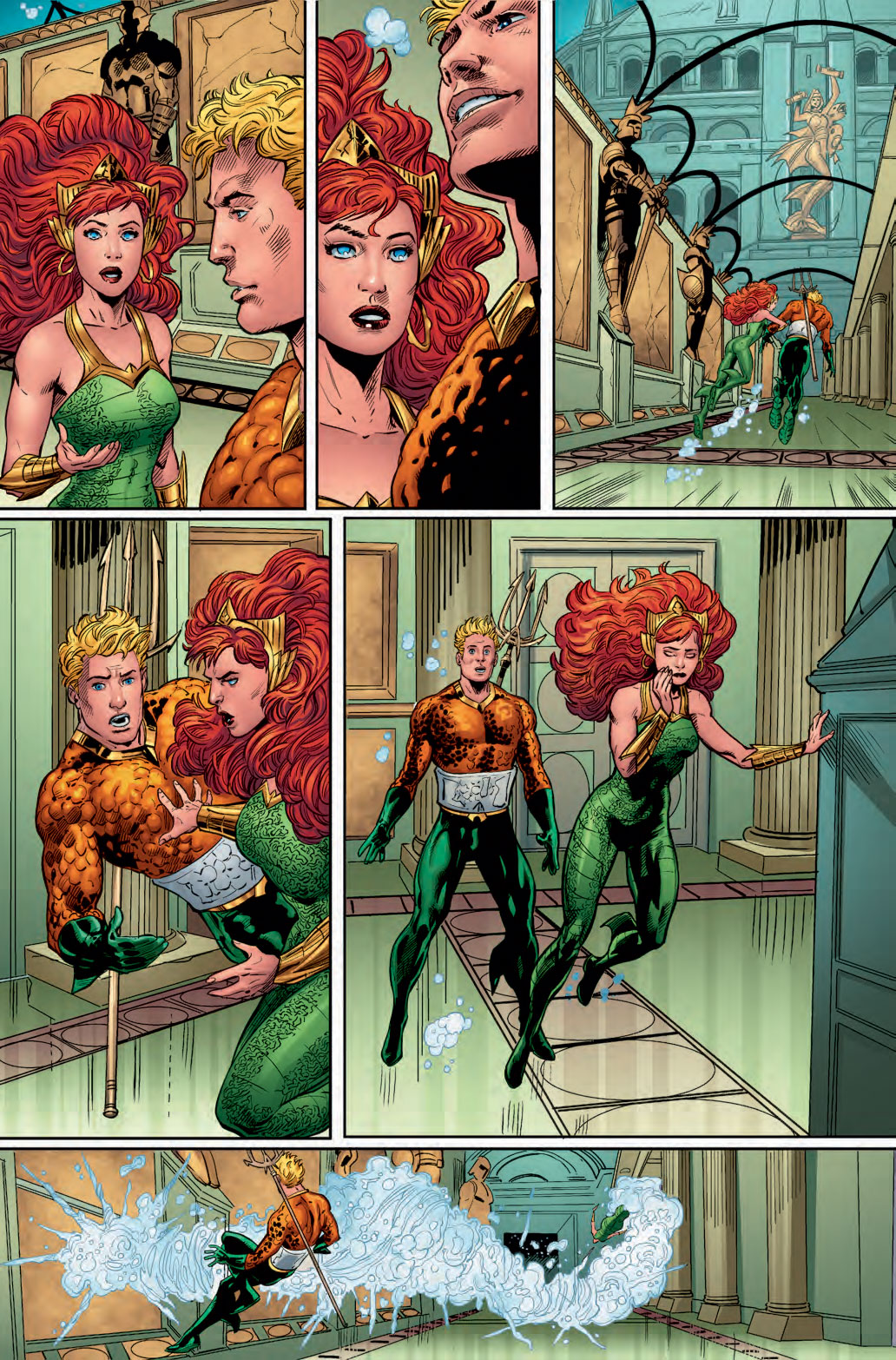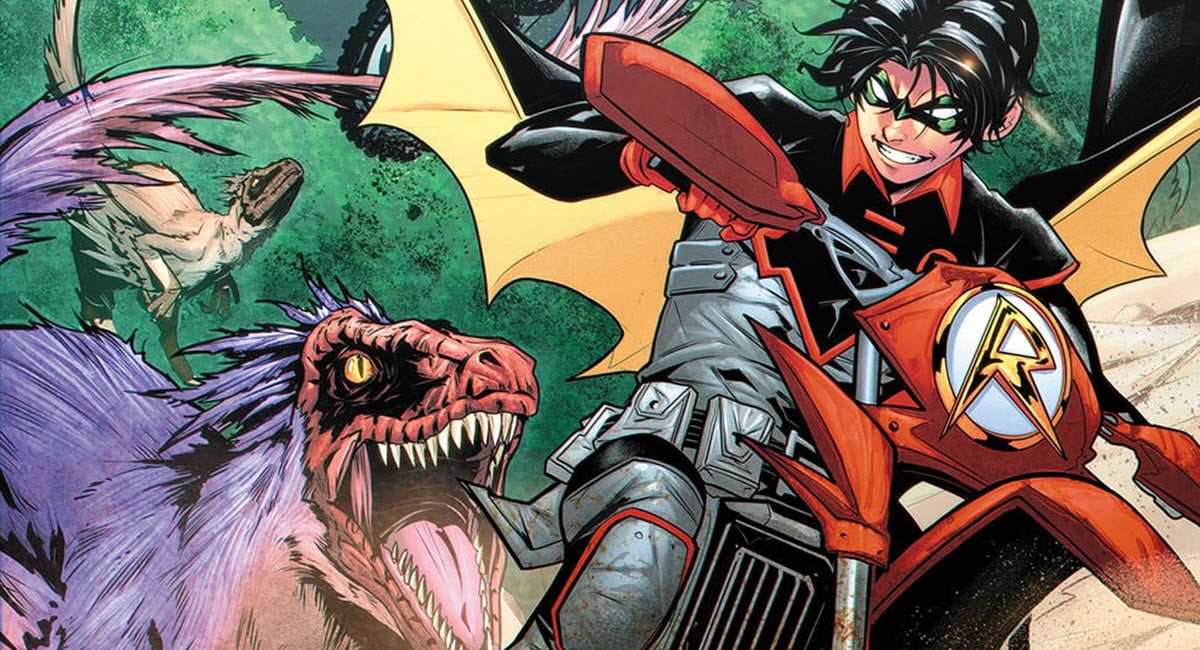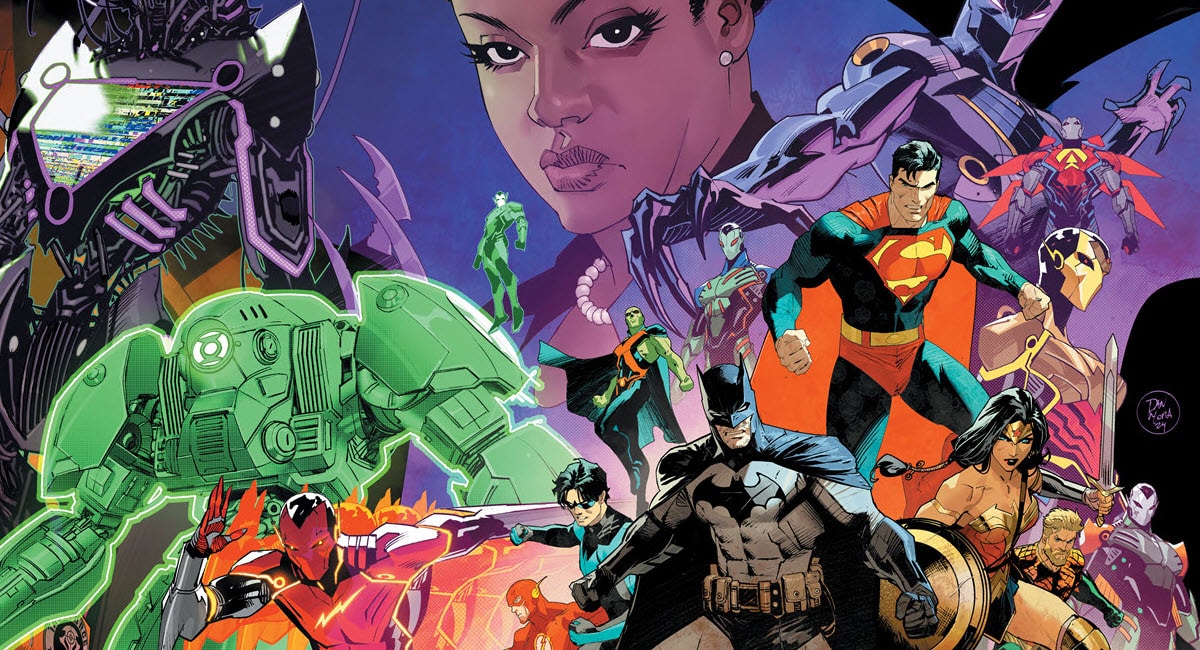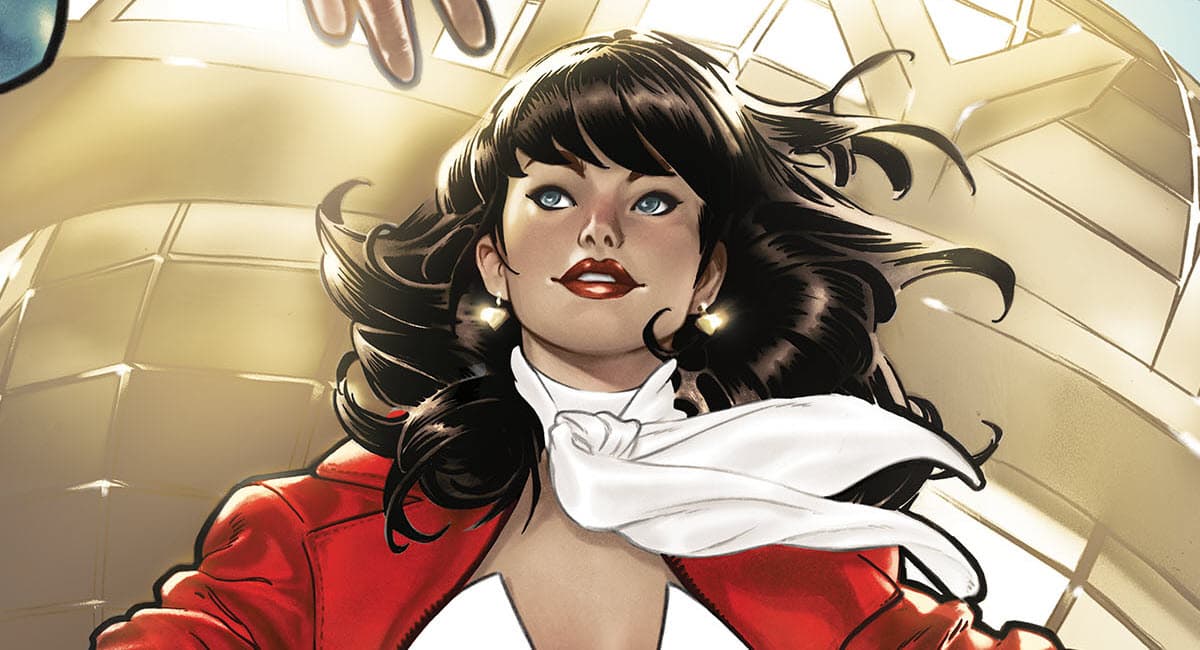This week sees the release of Aquaman #12, part one of “The Deluge”, the first major epic of Dan Abnett’s relaunched run on the character, which sees the Black Manta commandeered N.E.M.O. engineering a conflict between the United States and Atlantis that had been brewing since the first issue of the series. By the end of this initial chapter, readers see Aquaman come face to face with his teammates in the Justice League who have decided to take matters into their own hands, in forcing Arthur to put a stop to an all out war that they believe he is responsible for.
Our Managing Editor Alex Lu and Entertainment Editor Kyle Pinion got a chance to chat with Abnett about this new issue, his goals for the run overall, how the creative process has taken shape in the Rebirth double-shipped schedule, and where aspects of this take echo real-world zeitgeist.
Kyle Pinion: Thus far, your run has dealt a lot with the US military industrial complex and how it conflicts with Atlantis and its citizenry. In recent history, Atlantis and the US have been going head to head fairly frequently. Do you think there’s a viable, sustainable path to peace for these two warring nations?
Dan Abnett: I think there is. One of things I tried to do with Aquaman since I took over the character, is to examine every aspect of his heroism. Him being an Atlantean has been dealt with extremely well in the past. People have also looked into his role as a king. But I thought these were things that were timely to revisit in this turbulent era.
It seemed to me that this storyline is very much a tale that reflects the kind of Sci-Fi/Horror feel that Aquaman seems to do particularly well. In addition, popular culture is full of movies that are about America or the UK facing down rogue nations. These rogues are the modern bogeymen. Many people in the DC Universe regard Atlantis as this extremely dangerous rogue state that is capable of great harm, so I thought it would be interesting to explore that. Aquaman’s political ambition, to try and bring Atlantis back into the world and have it recognized properly as a nation while trying to allay the fears of his own people as well as the fears of those on the surface— that kind of conjunction is a good idea.
To me, it made perfect sense for America to be the one that Atlantis is engaging with because it kind of reverses the tropes. Americans will read the comics and see their nation taking action but not being wrong or [characterized] in any way as a villain. However, we engender some sympathy for the other side of the argument, Atlantis, as well.
Aquaman is determinedly set on this path towards peace because he’s both a surface dweller and an Atlantean. He really wants peace to happen even though he’s beset by problems, not only from America and the rest of the world, but from within Atlantis itself. Ultimately though, if anyone is going to bring peace to Atlantis and the world, it’s Arthur Curry. I won’t say any more than that because the storyline you’re about to see is the point of no return. There’s going to be some resolution to that— whether it’s a good resolution or a bad resolution, it’s not my place to say at this point.
Alex Lu: I find it interesting that you say that Arthur is so dedicated to this path to peace because I think that’s correct, but also that he is getting in his own way. One of his greatest enemies throughout this storyline has been his own hubris. He’s very reticent to call upon his friends in the Justice League or his allies in Atlantis. There’s a rift between Arthur and the rest of the world. What do you think motivates that choice to solve the problems of Atlantis without outsiders help?
Abnett: Like all interesting characters, Aquaman is not without personal flaws. He wants to build bridges, but the problems with Atlantis are very particular to that place. In the past, in stories like the “Throne of Atlantis,” for instance, even though the Justice League was very supportive of him, they also suspected his motives. In addition, they suspect Atlantis might be something that is too dangerous to control.
Also, Arthur has a degree of pride. He wants to prove that, as the king of Atlantis, he can do things without the help of outsiders. Obviously, this has put him in some very difficult situations so far. This is actually something that I quite like that about him—Aquaman is an incredibly heroic character, but he’s not beyond being blind to some of the problems his pride can get him into.
That also plays into something that I am trying to do with Aquaman in my run. In the comic, I acknowledge that in our real world pop culture, Aquaman is the joke superhero. However, instead of trying to prove to people that Aquaman wasn’t a joke superhero by writing a cool comic about him, I thought it would be better to import that idea over into the DCU so that even there is he regarded as “that odd guy that talks to fish.” He’s a little bit creepy and quite possibly a threat. Bringing this element into the DCU forces Aquaman to face his own reputation and deal with it.
Ultimately, I think reputation is what drives him to prove that he can do heroic feats single-handedly. He’s trying to prove that he is absolutely as good as anybody else in the Justice League, he doesn’t need the support. His powerset isn’t so limited that he needs to be backed up by a Green Lantern or a Cyborg or an Amazon. As you can see, that’s going somewhere— I’ve laid that groundwork throughout the story, particularly with his clashes with Superman and the Shaggyman.
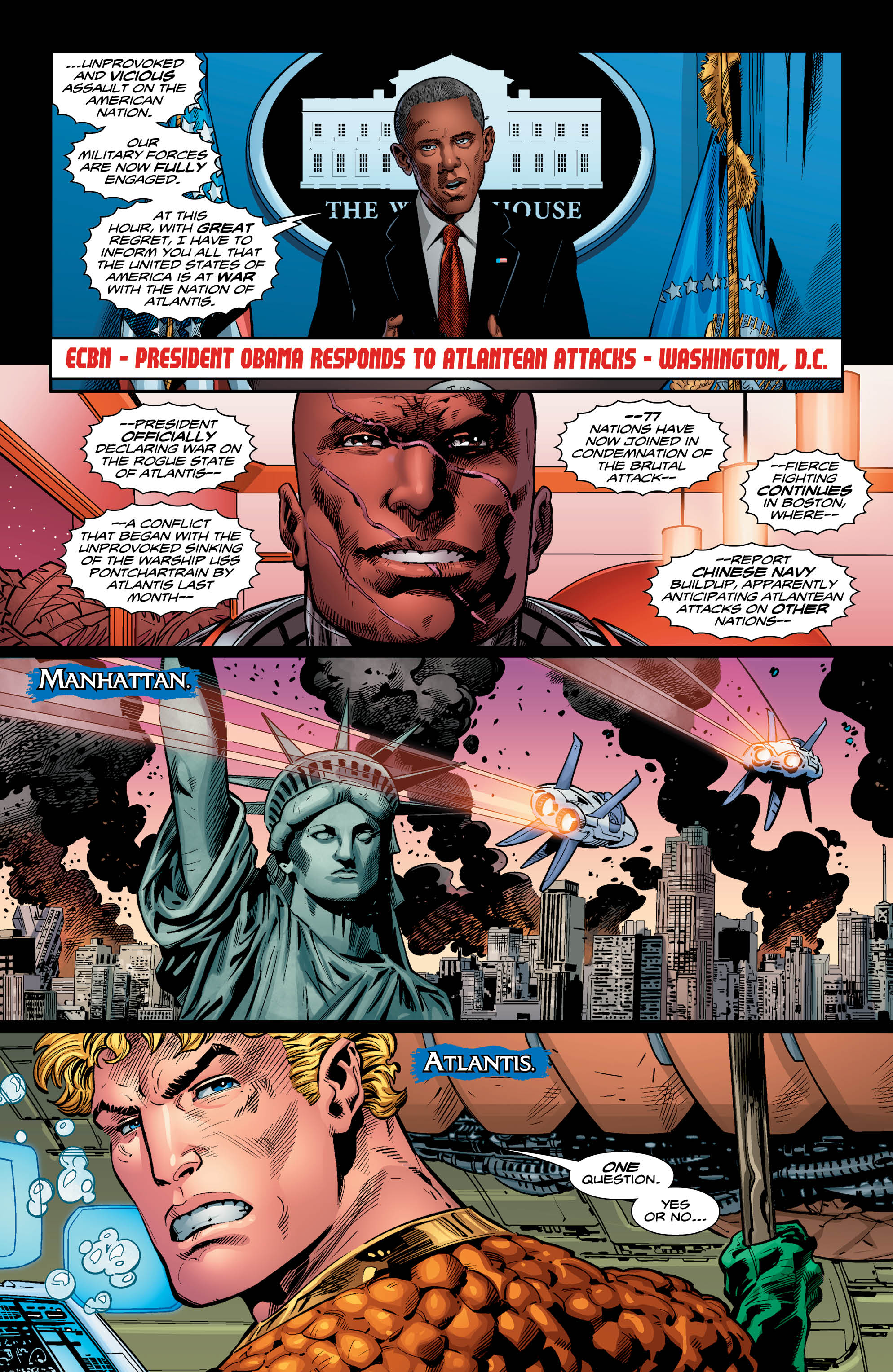
Abnett: That’s a harder task, and the only soapbox I’ve got to stand on to try to make that happen is the comic itself. If you encourage people to read it, and get them to say “oh Aquaman is not the joke character I thought he was,” then that is a step in the right direction. I have a feeling that Aquaman’s inclusion in the new Justice League movie will help somewhat— if only to remind people that Aquaman is a significant character.
I’m not the only person who’s ever tried to improve his image, clearly Geoff Johns did that superbly in his New 52 Aquaman run. He also acknowledged that Aquaman was often mistaken as a lame superhero with lame powers. However, he and other writers, particularly Peter David, have also spent a lot of time and effort making clear that this guy is extremely potent and interesting. On the occasions where I’ve written the Justice League, I’ve always made it clear that the members regard him as every bit an equal— in fact, to the point where some are actually a bit nervous around him because he’s not only physically powerful but also mentally so.
I don’t know what the big answer is, from our point of view, other than doing the best comic we can that presents him in a very strong way and hoping that message gets out there. It does seem that, in this day and age, ideas make that king of jump far faster than they used to. Perhaps something from the comic will be reflected in TV and movies and from there, will be reflected in the way the fanbase feels. After that, it will translate into a wider, more mainstream appeal.
Pinion: In Issue 12, President Obama makes an appearance. According to solicitations, it looks like there’s potential for reconciliation between Atlantis and the US Government thanks to the current administration. Will you continue to focus on real-world US policy makers in future issues and if so, will that affect Atlantis’ standing in any way?
Abnett: *laughter* That was the most delicately phrased version of that question I’ve heard so far— that’s brilliant! We’re not going to be dealing with the President or his chief officials every other issue from this point on. In fact, we will probably change course and do some other, hopefully equally dramatic, things.
It was odd to be writing something and know it was going to change at the moment it was being published. Bringing Obama and the president’s administration in was quite an interesting process because I was obviously writing the most recent issues of Aquaman prior to the actual election. In the Superman issues, I deliberately didn’t show the president. I thought it was actually much more realistic that Arthur wouldn’t be able to meet the president face to face and instead would have to deal with the Chief of Staff.
However, by the time we get to issue 12 and are on the brink of war, it made much more dramatic sense to see someone that we recognize as the President. We had conversations about who we should show as president or if we should we avoid dealing with the topic entirely. We also pondered whether we should be more oblique about who the President is by leaving a panel unfinished so we could insert a silhouette with the correct gender. Ultimately though, we decided that because Obama is currently president, he’s President of the DCU at the moment so we can run with that.
If we were to do a comparable story to this one in, say, a year’s time, how I would go about this connundrum would both depend on how I felt it would work in the context of what the Administration feels like next year. A lot depends on the next few months after January.
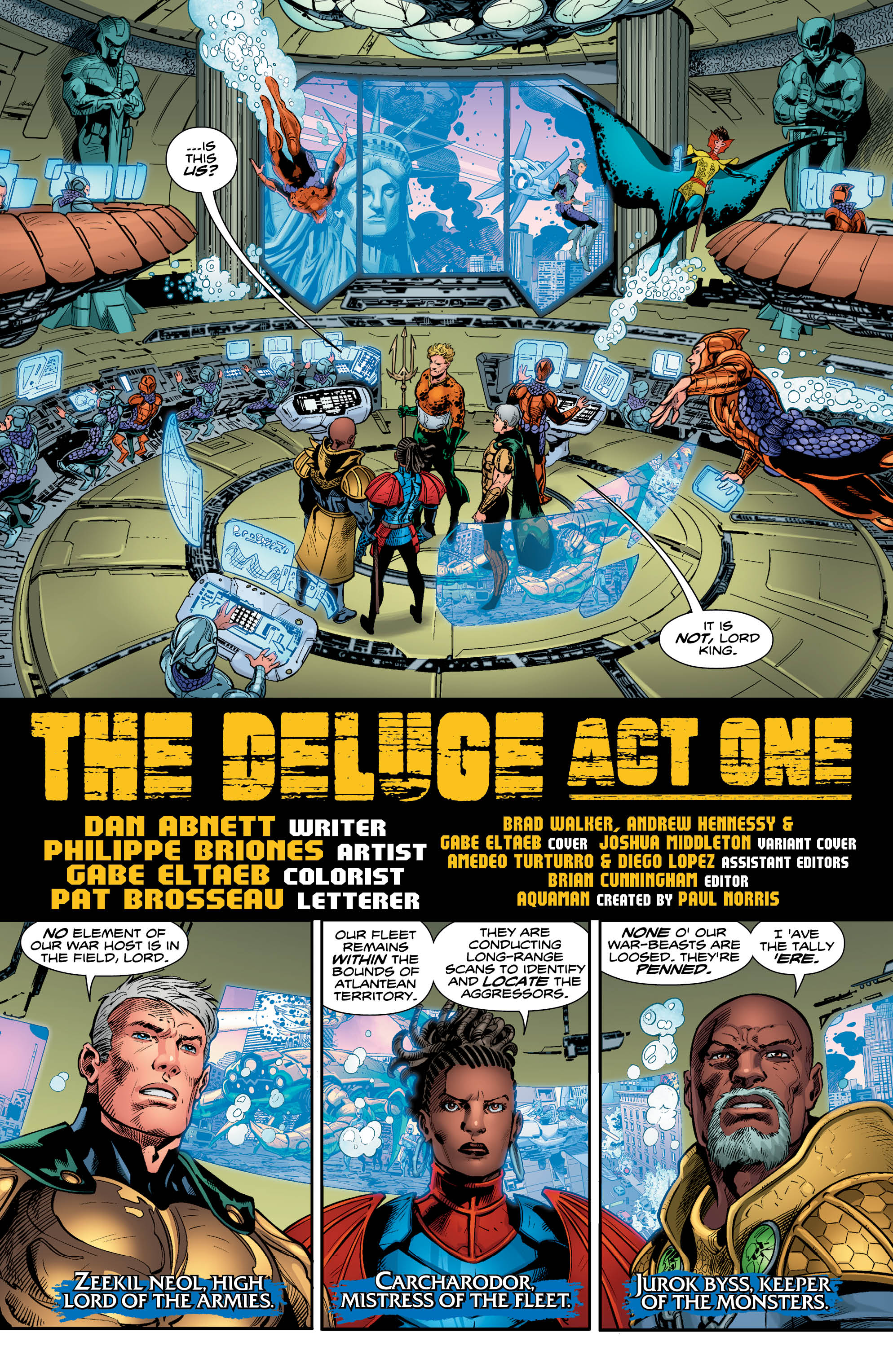
Abnett: Yes, to a certain extent. You can see that happening all over the place, the UK did it spectacularly this year through Brexit. Some might say the recent American Presidential election also reflects a significant change in how people respond to previously trusted institutions; a desire to at the very least, register some kind of protest vote, if not to actually try to overthrow those things and set up something else in motion. In some respect, everyone talks about how we live in very scary times, but I think we live in extremely interesting times. I have a friend who is a very well respected stand-up comedian in the UK, and he said after Brexit, it was very weird because almost all of his material had evaporated overnight. Nothing he could write or invent was big enough or satirical enough a jump beyond what was actually happening on an hour by hour basis in the news cycle. He just couldn’t think of anything more ridiculous than the actual world itself.
Whatever we think about the events of this year and whatever our feelings and political stamps are, we must admit that we live in a kind of very unpredictable age where history is shifting around us. I can’t remember that ever happening in my lifespan (which is of a significant length). We’re sort of, I hope, lucky to be witnessing it. I think it’s going to be very interesting to see what it does to sci-fi, comedy, satire, and comics. Mainstream comics are going to be particularly affected, as they sort of rely on the idea of a stable world in order to portray the extraordinary upon it.
Lu: Compared to how you felt when you started, how do you feel like your mindset has changed when you’re writing Aquaman nowadays?
Abnett: Because of the double ship, we work at least 4-5 months ahead of publication.Thusm sometimes when I look back at scripts, I find myself saying “well gosh, that almost seems naïve,” even though at the time it made perfect sense. So I’ve been going back and tinkering with dialogue.
In addition, as a British writer writing an American comic where America and Atlantis go to war, I’ve really tried not to portray America as a villain. I’ve tried to make sure what they are presented as doing is entirely reasonable, perfectly correct and understandable. I like the idea of presenting a conflict between two parties where you can sympathize with both parties. You’ll understand why they’re in conflict but you won’t side with one or the other. Thus, I have written scenes that are much different from the ones I imagined I would be writing. I feel a responsibility to be respectful to the institutions of the American Government and American Military because if you’re going to use them dramatically in a story, you should use them right. You shouldn’t make an unnecessary bogeyman out of them.
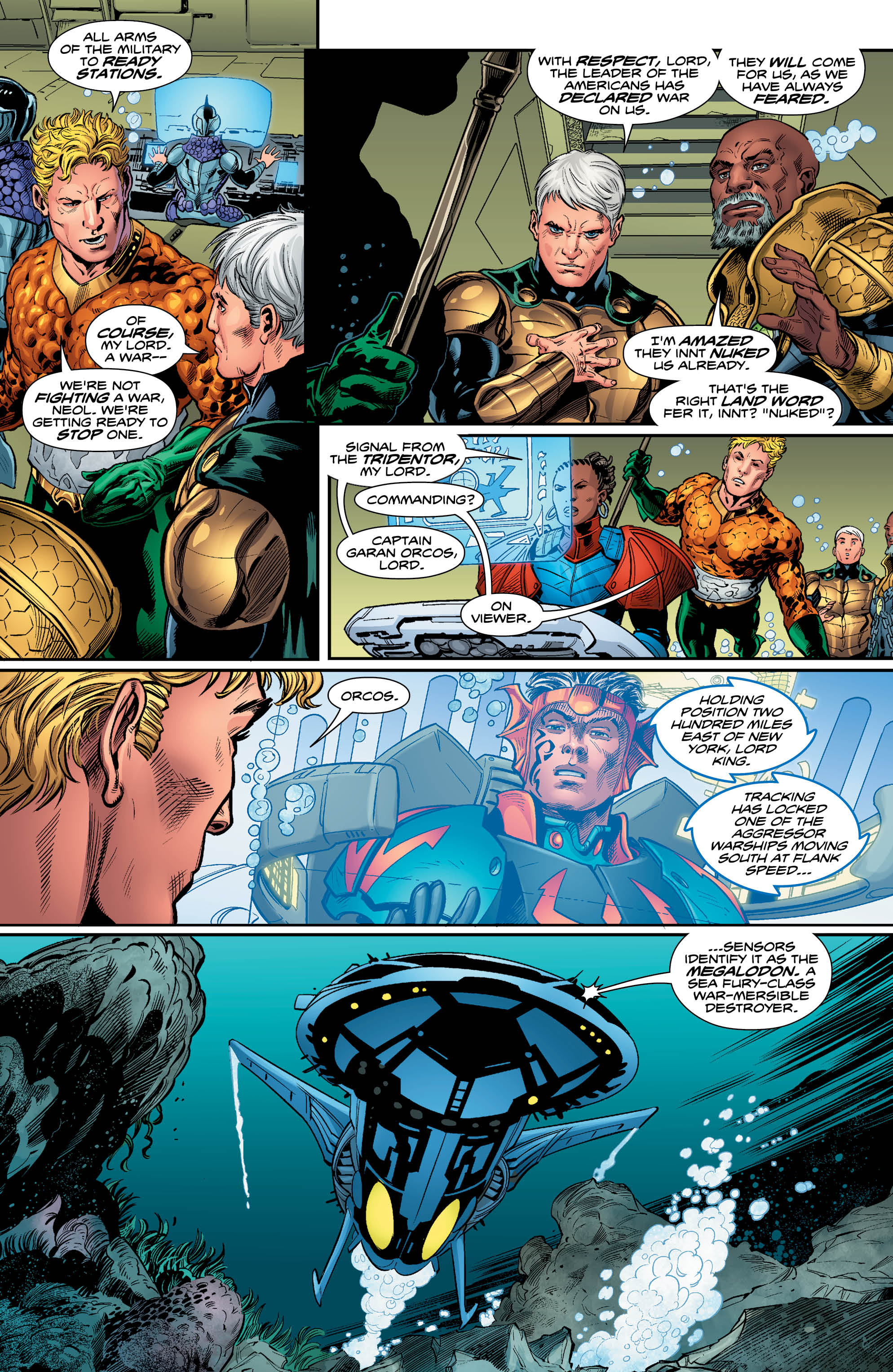
Abnett: This storyline arose from a number of different things. You don’t want a comic to be without drama or it becomes a dull read. Arthur’s and Mera’s marriage needed to be complicated but I didn’t want to complicate it with all the usual things a relationship plot is saddled with. I also wanted to Atlantis some real personality by populating it with institutions and a cast of characters who didn’t all speak with the same voice. The Widow was a part of that—I like the idea that they have a sort of wise spiritual nature that is linked back to a slightly more alarming medieval past, that has mystical overtones. In creating them, I allowed Mera to have a genuinely important obstacle to overcome— it wasn’t simply her getting cold feet or changing her mind about Arthur. We’ll see this factor into her decisions during “The Deluge” and it is something we will see picked up on afterwards as well.
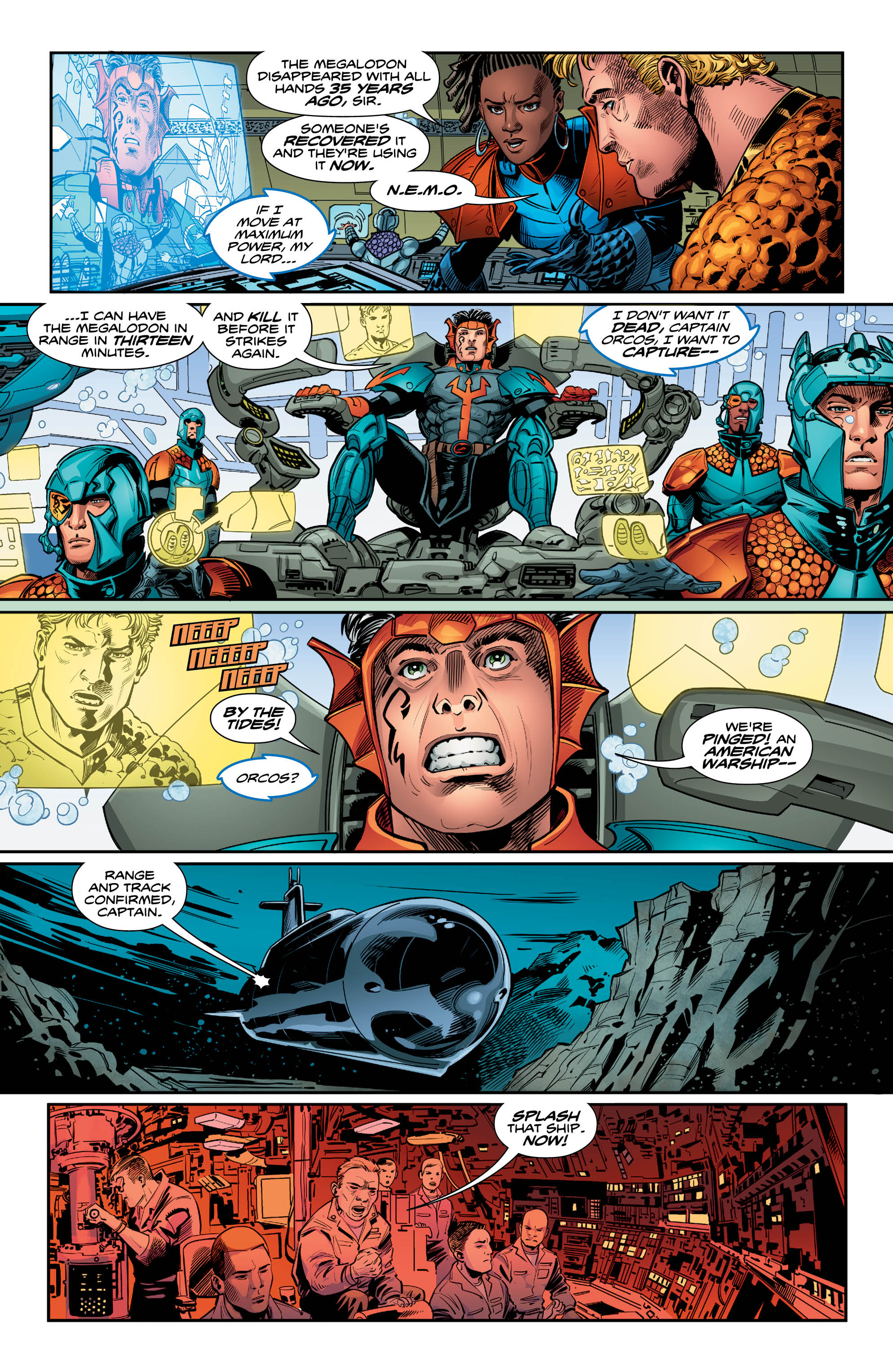
Abnett: There were all sorts of things, really obvious superficial things, but I suppose my Atlantis owes a nod to things like Dune in regards to complexity. Any of the great fantasy novels you could pick up has an idea of how to build a society that is vaguely convincing and when I write, I try to build societies that emulate those novels.
However, even more often than fantasy, I try to look at history. To look at the way that societies and communities have worked and then shift them sideways into a sort of fantasy setting. I always think that brings a great deal of authenticity to a world. I’m not comparing myself to him, but I think that’s very much what George RR Martin has done with Game of Thrones, which is based off the War of the Roses among other historical events. He’s looked at these things and extrapolated from them.
In order for a world to feel authentic, the people need to feel alive. If you lined up some Atlanteans, they wouldn’t all agree on everything It was as much as building an authentic world as to making it feel alive with its people. If you lined up some Atlanteans, they wouldn’t all agree on everything. While it’s one thing to represent Arthur’s status as King through the big trident in his hand and the big glass city behind him, it’s much more interesting to put him in operation with a court of people who have different skills and are useful for different things. They have different ideas which make his job more complex and more interesting. Arthur must listen to a variety of different points of view in order to do his job as king correctly.
Pinion: While we’re on the subject of worldbuilding—one of the things that struck me immediately was how Kirby-inspired the various armor designs of The Drift and The Deluge look. In comparison with Alex, I’m a long-time Aquaman reader who is used to much of Arthur’s royal guard being an army of shirtless men. What was the thought process behind the warriors’ new looks?
Abnett: There are a number of things behind the new designs. One is that sense of authenticity—we needed to make them look believable. Secondly, we wanted to look to the way The Drift has been portrayed in the past and extrapolate from that. I particularly looked to what Ivan Reis did during the New 52 and thought “that’s a great sort-of basic design. Let’s see where we can go from here.”
From there, it came down to Brad Walker. One of the things he did brilliantly with The Drift’s armor and their other technology was to look at what materials they’d be manufactured from—he based a lot of stuff on fish scales and coral. To me, it is fascinating that Atlanteans have fabrics, materials, and technologies that are not common to the surface world that they can use to construct things like Spindrift Station extremely rapidly and spectacularly. We were able to draw inspiration for jet-bikes, submarines, and massive war submersibles from that concept as well.
Because Aquaman is published twice a month we need more than one artist to keep ahead of the page requirements. Luckily, the artistic teams work brilliantly together. Everyone exchanges a lot of ideas. Quite often, someone will make a throwaway design of something and I or one of the other artists will go “that’s really good, can we use that?” The more you invent for your world, the more interesting those toys become to play with. Simple throwaway things become more significant and reusable.
Lu: I’ve been thinking about what you said earlier about making Atlantis feel alive. One of the most interesting things about recent comics like Scott Snyder’s and Greg Capullo’s run on Batman or Jason Aaron’s and Jason LaTour’s work on Southern Bastards is the emphasis on place. The locations of these stories feel like characters themselves. What do you think is the source of this trend?
Abnett: I think as much as any superhero book, Aquaman has a real world feel to it. At their best, Aquaman stories have a sci-fi and horror bent, so to make the world he’s in feel real and credible is important. Atlantis is similar to Gotham in that way.
Something you can notice in the work of really tremendous artists like Frank Quitely is that, no matter what room a character is in, the room seems real. The consequences of the actions that character takes in the room have an effect on their surroundings which heightens the sense of immersion. I love it when people are invested in making surrounding believable because then, even something as simple as a fight between two characters isn’t just brilliantly drawn dynamic figures— it’s brilliantly drawn dynamic figures working within a world that we understand and that we can think of as solid and believable.
When I was working on Hercules for Marvel, that’s something that Luke Ross did particularly well—he created a very grounded version of New York for Hercules’ exploits. By comparison, Atlantis is challenging because it is a very airy, vague, and pretty concept. It’s easy to say “oh look, people on seahorses, a few towers, statues, and that’s it”. If you do that though, Atlantis looks like kind of scenery you’d arrange at the bottom of a fishtank. This is why, in the past, I think individual issues of Aquaman have been more popular when Arthur is on dry land. Readers understand New York. They get what New York is and believe the story more even though Aquaman is—pardon the pun—a fish out of water.
This is why we’ve put effort into making Atlantis credible. It gives us the opportunity to set stories in a place where it makes sense for Aquaman to have stories without people going “yeah, but it’s just a bunch of seahorses.”
I wonder if the emphasis on environment has anything to do with the rise of the superhero movie. We see superheroes and their environments brought to life in such extraordinary ways that perhaps it’s feeding back into comics. Perhaps it’s creating a desire on the part of the artists and writers to create fully functioning worlds that are credible, and also a desire on the part of the readers to see that. You mentioned Kirby earlier, and he is an example of someone who always did that, and did it superbly. If we’re seeing a return to that, it can only be a good thing.
Pinion: Now I’ll ask the most annoying question: how much closer are we to the reappearance of Garth, Vulko, or Orm?
Abnett: Well, we’re closer than we were in issue one! Obviously, Garth is a character who is in the Titans. Therefore, it’s up to me to negotiate a way for Aquaman to appear in Titans or for Garth and the Titans to appear in Aquaman. As far as Vulko and Orm are concerned, obviously they are characters that I’d love to be in the comic as soon as possible. There are some longer term plans for them that are connected to Geoff’s promise to deliver the Seven Seas storyline which he set up during his New 52 run. We’ve discussed those plans at length and my hope is that, when the time comes, he and I will be able to work together on the story because Orm is a character who would play a very major role.
But that doesn’t mean you’ve got to wait that long to see some of these characters. I can’t be more committed to anything than that, but I’m very aware of the fact that these characters belong in the book and should be seen.
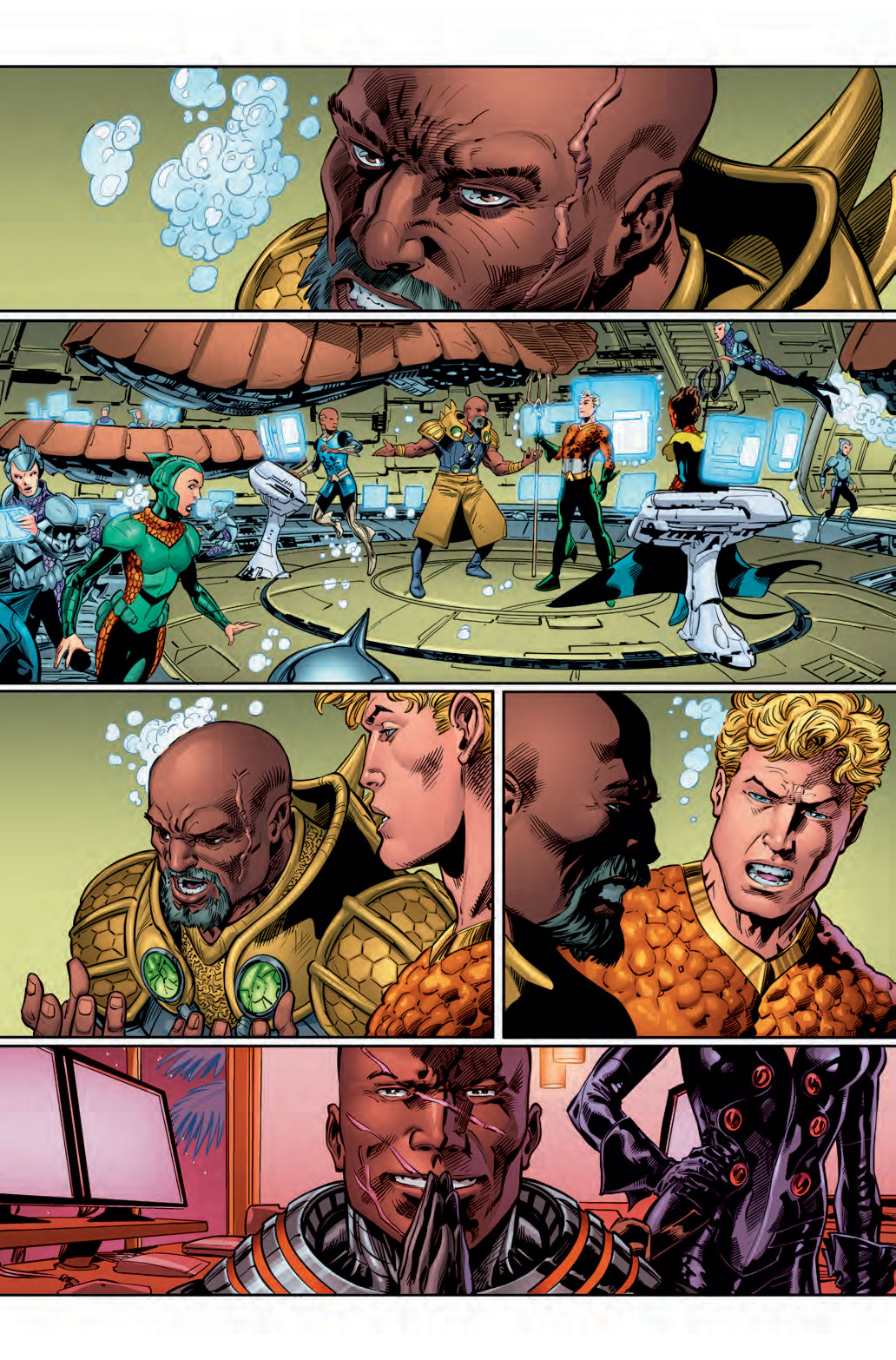
Abnett: I think she is probably one of most underrated characters in comics. She’s certainly one of the most underrated DC characters. In fact, the problem with her is that she almost overbalances the book because she’s as interesting, if not more interesting, than Aquaman himself. The temptation is to give her a starring role that could ultimately eclipse Aquaman, so I want to make sure Aquaman is used to his fullest because he’s a fantastic character. But she is such a strong character whose presence is vital to Aquaman’s existence because compared to many DC superheroes, Aquaman has a small supporting cast and rogues gallery. It would be terribly boring if a TV show just had one character on the screen all the time. You need a supporting cast to round a story out and give the lead different people to bounce their personality off of. It’s how we get to know Aquaman better. That’s why it’s valid to add new villains, develop existing ones, and give a bigger role to characters like Murk. Ultimately though, Mera is the most perfect sounding board for Aquaman and through their interactions, we get to know him and her better.
But she’s a fantastic character— she should be more famous than she is.
Lu: Then how close are we to the Mera solo book?
Abnett: (laughter) That would be very cool. Don’t think it hasn’t been discussed!
Pinion: As a long-time DC Fan, the issue where Superman and Aquaman go head to head was emotionally affecting because it provided a unique look into the way Arthur sees himself. In the upcoming confrontation between Aquaman and the Justice League, how do you plan to expand on the various ways the League members feel about Arthur?
Abnett: The members of the Justice League are all individuals. In their own different ways, they all respect Aquaman and he returns that respect. Thus, their responses to him will be different as well. I think the clash with Superman was important because it pinpointed exactly how alone Aquaman feels. At the end of that fight, he wasn’t even necessarily even a member of the Justice League anymore at least, didn’t feel entitled to be one because of the way people stood in his way and did not support his efforts.
However, in the aftermath of the Shaggyman story, the Justice League visits Arthur in the hospital. Here, I made a deliberate attempt to show that there was some reconciliation at that moment. They had given him a chance, had trusted him, and were his friends. Of course he belong with them. This reconciliation makes what happens at the end of issue #12 more dramatic because now the Justice League is coming to him and saying literally “we gave you a chance and now this war is happening”.
Arthur needs to convince the League members that he is not the cause of the fighting and is doing his damndest to stop it. That will elicit some different responses from different people. I hope Justice League fans and readers will be very pleased to see them represented well and playing an interesting and perhaps unexpected role.
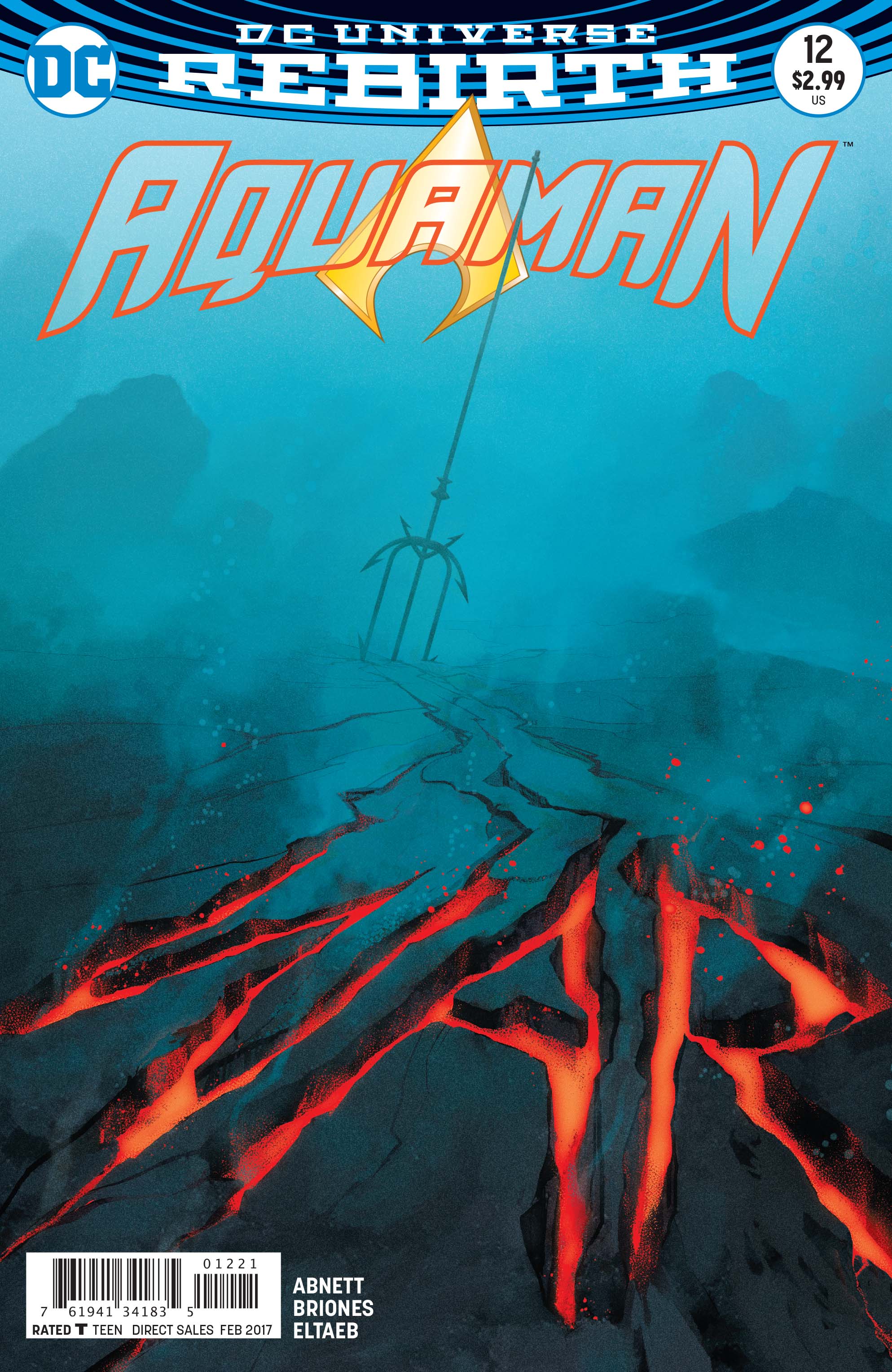
Abnett: It is intricate and very fluid. By necessity, we have to plan that far in advance to make sure all the scripts are in place to give the artists enough time to deliver. However, one of the biggest strengths of working ahead is that I have the opportunity to move things around. I have many ideas for many good strong stories and story arcs and I have an ideal way to linking those things together and the order in which they should run. But as things change and as we see responses to certain storylines, it gives me the opportunity to say “okay the story I thought I was going to do next I will delay that and will push that further down and will do this instead because that’s a much more interesting response to that”. The overall shape remains the same but I can make adjustments and change the order in which things happen.
For instance, at the moment, I’m working on an issue of Aquaman in the early #20s and I’m doing a story which actually I would have expected to have done before issue 10. But it just wasn’t right to have done it then because it would have interfered with the way the bigger storyline was flowing. So we postponed it, we put a pin in it, and now the right moment has occurred and we’re putting it into place. In fact, this version of the story is much better than the one that would have run if I had done it when I originally intended to.
The burden obviously falls upon the artist, because they’ve got to produce work at such an extraordinary rate, but the work has been consistently amazing. One of the nicest things about our team, and I’ve mentioned this already, was the self-started organizational structure they’ve implemented. Right from day one, all the artists, whether they were working on an issue or not, got to see what everyone else was doing. We’d all see layouts, pencils, inks, and colors going back and forth. Because of that, everyone could chip in and assist.
I remember early on, one of the artists delivered pages and one of the other artists who had worked on the issue before that one said “these pages are fantastic, but don’t forget that on page 3 of my issue, part of Aquaman’s suit got damaged”. More recently, we had to make a slight to change to something in an issue you have yet to see. We had an idea that was working and built on that, but then it occurred to us that there was an even better way of getting the idea across, but it required some redesign work. All the artists just jumped on and did a little bit each. Everyone got involved with designs flying all over the place. It was a delight to watch it.
I haven’t worked on a double-shipped comic before, but to me, this is the way to do it.
Pinion: This partnership between Black Manta and Black Jack feels like it can’t last, particularly given Black Manta’s predilection for revenge. Is that something we’ll see come to a head soon?
Abnett: I think it’s safe to say you’ll see their relationship come to a head soon.
Black Manta is a very interesting character to me. When the time came to launch the series, I wanted to put a major villain at the front of it and Black Manta was the obvious character to go to. At first, he’s focused extraordinarily on revenge. That’s all that he’s about. However, when Arthur takes him down, he does so not just physically, but mentally. He tells Black Manta “you’re sort of wasting your life. You have this huge potential to be something, you’re an incredibly capable person, but you’re all about revenge and it’s just going to destroy, you and me or both. And it’s relentlessly pointless.”
I take great delight in the ironic thread that comes from Aquaman’s words here because after Manta realizes Aquaman is right, he’s abducted by N.E.M.O.. Manta sees what they’re capable of and decides he’s going to take control of them and use that power as a direct consequence of the talking to he got from Aquaman. In this way, Aquaman has created his own archnemesis and made him worse by empowering him to think about something beyond simple revenge.
Now, Black Manta is the mirror image of Aquaman in many respects. He’s hidden at the middle of this metaphorically submerged and secret society while Aquaman is the head of a literally submerged and secret society.
Pinion: What are some teases you can share regarding what’s coming up?
Abnett: I think this storyline that starts with Issue 12 is the biggest so far. It’s a really spectacular, epic story. It’s big screen, big budget but also has some strong personal threads running through it. After that, we’ll be introducing a brand new villain and if all things go according to plan we’re going to have at least one sort of quieter/aftermath issue that’s very character driven. Those stories are always refreshing after a big story because you get that moment to reconnect with everyone. After that, there’s another major story arc that I’ve been waiting to do since day one which brings back a really strong villain that really plays up Aquaman’s penchant for sci-fi and horror. But this one, I hope, will really help people stand up and take notice— it’s big!
You can pick up Aquaman #12, the first part of “The Deluge” at a local comic shop near you or on Comixology.


